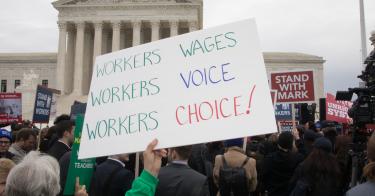Are public employees who opt out of union membership free riders or compelled riders? That’s the issue now before the Supreme Court in an important First Amendment case.
Mark Janus is an Illinois state employee who declined to join the local union. But he discovered that the state was deducting an “agency fee” from his paycheck to cover his share of the costs of collective bargaining. He soon found out that a 1977 Supreme Court case, Abood v. Detroit Board of Education, upheld agency fees under the theory that the state has compelling interests in dealing with an exclusive representative for its employees, and in order to prevent labor unrest.
But Abood has been living on borrowed time. In 2012 and 2014, a majority of the Supreme Court questioned its constitutional validity for imposing a “significant impingement” on public employees’ free speech and association rights.
In 2016, the court was poised to overrule Abood in a case involving the California teachers’ union. But with Justice Antonin Scalia’s sudden death, the remaining eight justices deadlocked 4-4. After Neil Gorsuch took his seat on the Supreme Court, another challenge to Abood quickly made its way up to the justices. Now, they are presented with another opportunity to overrule Abood and make clear the First Amendment protects public employees.
A brief filed by Attorney General Bill Schuette explained how collective bargaining is indistinguishable from lobbying and involves matters of great public concern. Schuette detailed how collective bargaining over pensions for public employees contributed to Detroit’s bankruptcy, and the state had to cover the $350 million shortfall.
During oral argument for the Janus case, Justice Sonia Sotomayor brought up the “free rider” problem — that employees who opt out of union membership would receive the benefits of collective bargaining without payment for them. Wouldn’t a ruling for Janus lead to fewer employees contributing to unions? The lawyer for Janus explained that unions are required by law to represent non-members and members for the purposes of collective bargaining. Solicitor General of the United States Noel Francisco also appeared, explaining the federal government does not permit unions to charge non-members an agency fee, yet one in four federal employees chooses to join a union anyway. In right-to-work states such as Michigan and 26 others, public-sector unions remain active without agency fees.
After an hour of oral argument, none of the eight justices who previously ruled on this issue appeared to have changed his or her mind. Gorsuch, the likely deciding vote, was noticeably silent. Now we wait.
This piece originally appeared in The Detroit News



